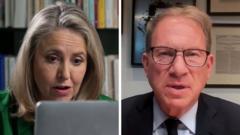Jeffrey Goldberg, editor of The Atlantic, finds himself at the center of controversy after accidentally being added to a Signal chat with key national security officials, where sensitive military information was discussed. As Trump officials retaliate with personal attacks, Goldberg reflects on the implications of the leak and the accountability standards for public figures.
Inside the Signal Leak: A Journalist's Perspective on a Political Fiasco

Inside the Signal Leak: A Journalist's Perspective on a Political Fiasco
An examination of a recent breach involving sensitive U.S. military operations shared in a group chat, spotlighting the fallout faced by journalist Jeffrey Goldberg.
In a twist that seems pulled from a spy novel, The Atlantic editor Jeffrey Goldberg recently found himself inadvertently embroiled in a political firestorm after being added to a Signal group chat featuring high-ranking U.S. officials, including Secretary of State Marco Rubio and Secretary of Defense Pete Hegseth. These officials publicly shared sensitive information regarding an upcoming military operation against Houthi rebels in Yemen without realizing Goldberg was observing their discussions.
Goldberg's involvement began with a message from National Security Advisor Michael Waltz, which the journalist initially dismissed as a prank. However, it quickly became clear that he was witnessing a major conversation among national security leaders about operative details, leading to a significant scoop shared in The Atlantic.
In an interview with the BBC, Goldberg revealed the challenging implications of the access granted by this critical error. While Waltz later claimed he intended to invite someone else, he confirmed that he had Goldberg’s phone number—an indication of a more complicated relationship. Despite being the target of derisive comments from Trump and other officials labeling him a “liar” and a “sleazebag,” Goldberg stood firm, suggesting that the details he received inherently warranted scrutiny.
The ordeal escalated when Goldberg published a story detailing the sensitive information shared within the chat, prompting harsh rebuttals from Trump’s administration. As the fallout unfolded, Goldberg expressed disbelief at the personal attacks directed towards him, emphasizing that a tough position is often countered with retaliatory rhetoric rather than accountability.
Critics argue that if lower-level personnel exposed secrets in a similar manner, the repercussions would be severe. This recent incident has provoked discussions around the ethics of information sharing and the potential consequences for those who mishandled classified details.
Amid the chaos, Goldberg has opted to leave the conflicted chat, citing the importance of navigating the ethical implications at play. The repercussions of this unprecedented breach will likely fuel future debates about transparency, national security, and the responsibilities of public officials. With calls for investigations gaining momentum, the unfolding narrative will continue to shape discourse on leadership accountability in Washington.





















